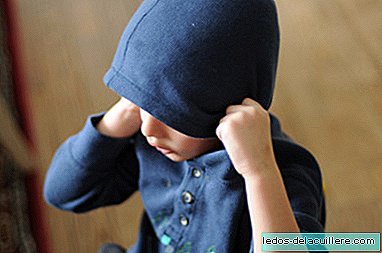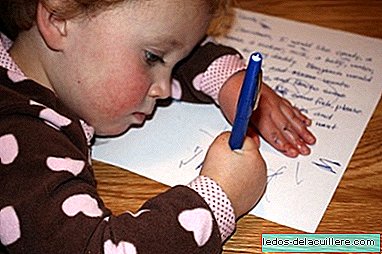
'Change the Letter' is a campaign that aims to call our consciences and tell us that in the world there are millions of children who must work, being deprived of very basic rights for their development.
The song to which we can change the lyrics is known to all of us, remember? 'Tuesday before lunch, a girl went to play, but could not play because she had to sew ...' The children who star in this melody are children who have only one task assigned within their home. The problem comes when there are children around the world forced to collect, glue soles of shoes for sale, or perform other activities aimed at financially helping their family.
They lose with it the possibility of playing, reading, being with their parents, studying ... because it is not the same to sweep the kitchen than to be 12 hours a day in a factory
The magnitude of the figures (scandalously removed from our daily lives)
According to the United Nations About 1 in 6 children between the ages of 5 and 14 suffer child labor. Comparatively, child labor affects more boys than girls. However, the jobs girls do are more hidden: domestic work and some of the worst forms of child labor, such as prostitution and pornography. It is estimated that 90% of children working in the domestic service are girls.
Child labor is a serious violation of the most basic rights of children: damages the physical, mental, emotional or moral development of children; deprives them of the possibility of going to school; they are separated from their families, exposed to serious dangers and diseases and / or abandoned to their fate in the street of big cities.
Child labor robs children of their childhood and their possibilities of development because working children, deprived of education and health, have little prospects for the future in their adult lives. They also receive the lowest wages and receive the worst working conditions, which can cause them permanent physical injuries and chronic health problems.
Whose responsibility is it to end child labor?
An unavoidable part of the fight against child labor falls to the affected governments, which must promote economic and social policies that protect the most vulnerable sectors of the population against labor exploitation and lack of protection in case of job loss.
Among other possible actions, and according to a report recently published by the International Labor Organization, universal social security coverage, at least at an adequate minimum level, is key in the protection of children from child labor.
This responsibility of governments does not exclude or exempt the productive sector from its responsibility in respecting the rights of its workers. Better global working conditions result in better support for families, avoiding child labor. On the other hand, rigorous control of the production chain is necessary, since in many cases, boys and girls work through subcontractors.
Let's change the letter against child labor
By sending an SMS changing the activity that the child is destined to do (dance, study, read ...), 1.20 euros is donated to UNICEF, and a code is received to see the changed video again.
Real actions with an impact on child labor
But when you want to change something as serious as the situation of so many children, a text message, a 'like' or a forwarding is not enough. It is not that I have lost confidence in these forms of modern solidarity, it is that I believe that a real implication is force us to inform ourselves about these situations, and stop consuming products that have been made or collected by children.
As consumers we have an important role in the eradication of child labor: responsible purchasing, reflection on the effects of our consumption patterns in the productive chain and the refusal to buy products that we suspect may have been produced under operating conditions They are key to effective pressure against child labor.
Consumers can demand from companies a policy of transparency regarding their productive chain, asking them to clearly report on the measures they are taking to prevent abuse and exploitation in the manufacture of their products.
I don't like to think that the problem of child labor is a distant fact to my family, after all, the children who suffer from it are children like mine, and sure they deserve better living conditions.












